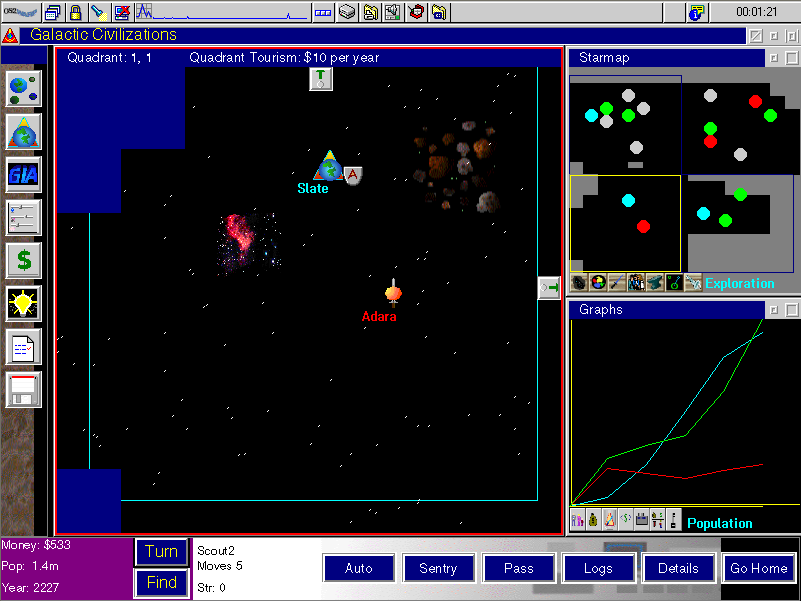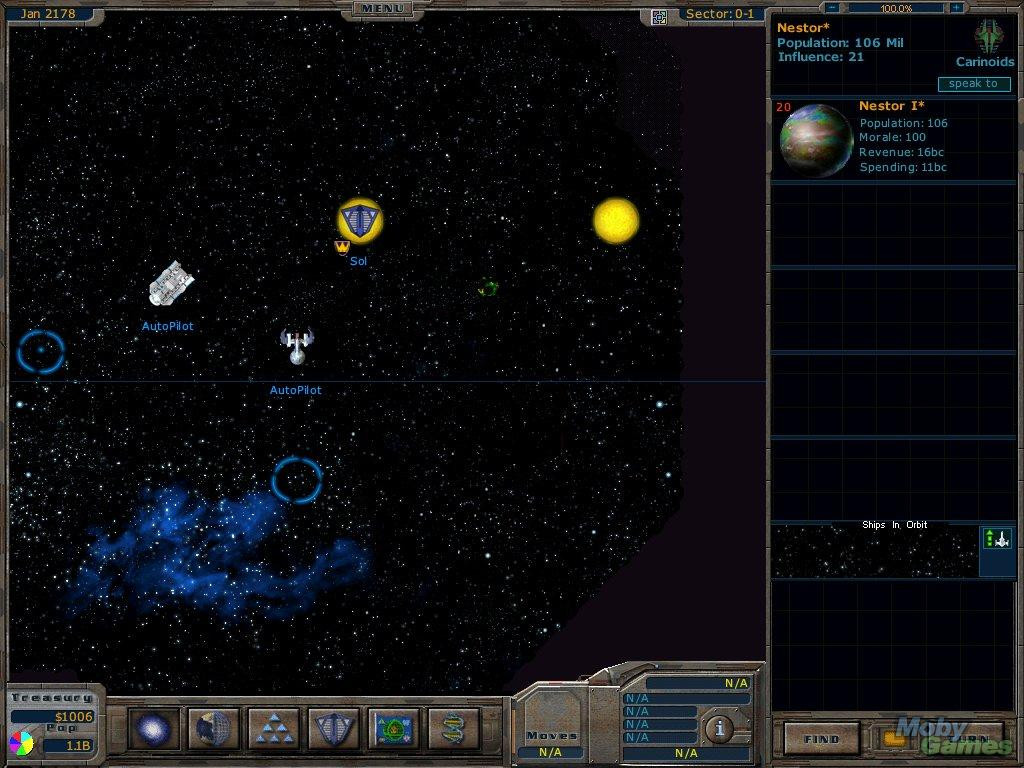It’s been a while since I’ve done an in-depth story on a developer I admire. So let’s fix that!
Brad Wardell, as you probably know if you read this blog, is the president, founder and CEO of Stardock, a software development company that specializes in two different types of software: operating system customization software and games.
Brad’s entry into software development was almost accidental. His first serious business foray was into hardware – in 1990 he started building computers and selling them pretty much out of his house (a la Michael Dell). He called his company “Stardock Systems”. In 1992 OS/2 was released and Brad felt that he could gain a competitive advantage by preloading OS/2 onto the computers he sold. In doing so he became quite familiar with OS/2.
In 1993 he realized there could be a market for an OS/2 game. He had never programmed before, so he bought two books: Teach Yourself C in 21 Days and OS/2 Presentation Manager Programming, and using the information in just these two books, he wrote Galactic Civilizations.
As you can see, GalCiv was a bit primitive graphically. At the time, Brad only knew how to create windows and icons, so everything you see in GalCiv consists of one of these two features. But it was a critical success (and not just because it was practically the only OS/2 game at the time). It was well-designed and had some excellent AI. Now, I recall being at Origin at the time and watching GalCiv top lots of “Game of the Year” lists for 1994…a lot of us at the time couldn’t understand how Origin games had lost out to an OS/2 game that…well, looked like that.
But as good a game as it was, Brad made almost no money on it. He was ripped off by his publisher and couldn’t afford a lawyer to fight back. He learned a very valuable lesson the hard way – a lesson that almost sank Stardock.
But what the publishers couldn’t take away from him was the name Stardock on the box. While the success of GalCiv didn’t profit Brad, it did raise the profile of his company. Brad was able to profit by writing an expansion to his own game called Shipyards, which sold well enough to keep him going for a bit. IBM came to Brad hat in hand asking if Brad could create a special version of GalCiv for the IBM OS/2 game pack. Brad did, which he titled Star Emperor.
Brad had always been intrigued by the idea of customizing the OS/2 operating system, and in 1994 became convinced that an OS customization tool for OS/2 could be profitable. This lead to him teaming up with fellow OS/2 enthusiast Kurt Westerfield to release OS/2 Essentials, the software that would eventually become Object Desktop.
And Brad was also able to get the rights to the “Galactic Civilizations” name back and republish the game (with improvements) as Galactic Civilizations 2 for OS/2.
And at this point, he figured the game was over and he’d won. By twenty-four he was a millionaire and Stardock was not only selling tons of copies of OS/2 Essentials and GalCiv 2 but publishing other people’s OS/2 software as well.
And then he made his second mistake – he allowed his zealotry for OS/2 to nearly wreck his business.
IBM quietly dropped support for OS/2 in 1995, and Microsoft released Windows NT 4.0 (the one with the much more usable “Windows 95”-style interface) in 1996. Windows NT 4.0 quickly captured OS/2’s core market. There were lots of people (including some of my friends at Origin (Hi, J. Allen!)) who believed that even if IBM’s support of OS/2 was a bit spotty, the superiority of the platform plus user advocacy and support could make the platform a success.
Needless to say, it didn’t work. Soon Brad began to realize that something was wrong, but Stardock continued to release OS/2 software until 1998. This could easily have been the end of Stardock, but two things saved his company.
The first was an employee, Mike Duffy. Mike was the lead developer on Entrepreneur and decided he would write a low-level, cross-platform library that worked on both OS/2 and Windows. This enabled Stardock to finally start making the transition from OS/2 to Windows.
The second was customer loyalty. Stardock at this point had a whole bunch of customers who didn’t just buy their software – they were fans of the company. They wanted to see the company do well. So they actually bought subscriptions to Stardock’s online ObjectDesktop.Net service before it was actually ready. Because of this, while 1998 was the worst year in Stardock’s history they managed to pull through, and by 1999 they had begun to release Windows products.
By 2000 things were looking up again. Brad’s focus on desktop customization software was paying off, with WindowBlinds, ObjectDesktop and DesktopX all selling well. Stardock avoided the dot-com crash of 2001 by actually being profitable and having a business plan, and by 2002 Brad decided that the company was ready to get back into games again. The first had to be a version of the original Galactic Civilizations for Windows.
But development of GalCiv for Windows slowed when the launch of Windows XP approached. Because Windows XP had more customization features “out of the box”, Brad was concerned that people would feel they didn’t need Stardock’s customization software any longer. In fact, the exact opposite happened – Windows users who had never been exposed to desktop customization before saw it in Windows XP, experimented with it, and then turned to Stardock when they ran up against the limitations of what the built-in customization could do. Needless to say, this was a great relief for Stardock.
In 2003, Windows finally got a version of Galactic Civilizations. This edition included everything from the OS/2 versions of Galactic Civilizations, its expansions and its sequel (thus, GalCiv for Windows is equivalent to GalCiv 2 for OS/2). Plus it now looked like this!
At the same time, Stardock had been beefing up their digital content delivery system. Galactic Civilizations for Windows was available at retail and online on the same day. Retail boxes included a code that could be entered into Stardock Central, which registered the user’s copy and allowed them to download the latest version.
Stardock Central quickly expanded to allow digital delivery of any product Stardock published – and Stardock had gotten back into the business of publishing other software.
And in 2006, Stardock released Galactic Civilizations 2, and Brad briefly became the focus of the DRM debate when he stated that GalCiv 2 had no DRM and never would. This caused some criticism from DRM providers (indeed, a Starforce employee actually posted a link on their forums telling people where they could pirate GalCiv 2) but Brad’s decision does not seem to have affected GalCiv 2‘s sales, which have been excellent.
And in 2008 Stardock updated the perfectly functional but kind of hoary old Stardock Central with a flashy new version called Impulse. Impulse is quite comparable to Valve’s Steam in that it’s a system designed to allow people to buy and digitally download software from a host of different companies, but is different in that Impulse doesn’t require an internet connection simply to play games, but only when purchasing a new game or using other online features.
Brad long ago returned to millionaire status and has stayed there since. His strategy of cultivating a loyal fanbase and shipping excellent software while staying out of debt has allowed Stardock to grow into a major online presence and allowed him to overcome his missteps.
Brad has developed a rather…unique online persona. During his stint on the Poweruser.tv podcast, he effectively acted as the “comic” to host Kristin Hatcher’s “straight man”, saying and doing outrageous things simply to get her reaction.
Brad has also been at the core of several flamewars about OS customization, routinely insisting that the customer is not always right – especially when catering to certain customers would hurt his business. At one point he exclaimed in a forum post, “I’m too old and too rich for this shit.”
His political views seem to lean toward the individualist, and he has a particular hatred of taxes, seeing them as good money given to the government who will then give it to people who haven’t earned it and probably won’t deserve it.
Overall, I think Brad is a great guy who had to overcome incredible disadvantages to succeed. If I had the chance to work for Stardock I’d probably jump at it. Despite having to move to Michigan.



Then I suppose you saw this?
http://www.joystiq.com/2009/07/15/stardock-hiring-lots-of-devs-hints-at-upcoming-projects/
Uh…NO. Good grief, this is the second time this has happened!
On the demise of OS/2.. I saw two things that really killed it; there could be others.
1. Single message queue
2. IBM’s hatred of developers (and possibly other customers)
#1 meant that one app could spam the message queue and destabilize the system. Windows has a separate message queue for every app. #2 included things like having to buy separate SDKs for different OS features, which (among other things) lead to pretty much nobody doing free software for the platform..
OS/2 was great for one thing: for developing DOS software. App crashed? No need to reboot..
Gal-Civ never really did it for me, I got my fill of galactic empire simulation with the glorious Master of Orion II.
I did, however, purchase Demigod, and had a blast with the singleplayer component for a solid week or so. Unfortunately, the MP hadn’t been patched to “actually works now” status before TF2 updates came out and made me completely forget about the game. At some point I reckon I’ll get that RTS itch again and come back to it.
As for Impulse (which you have to install to play Demigod, which annoyed me to no end): I’d call it a somewhat uglier, vastly less functional Steam. Less functional in that the Buddy list wasn’t quite working yet and the game catalog was pretty lame compared to Steam’s vast offerings. Also, Impulse emails me every week to beg me to look at its previously mentioned crappy catalog, whereas Steam only pushes its wares on me right when I turn it on.